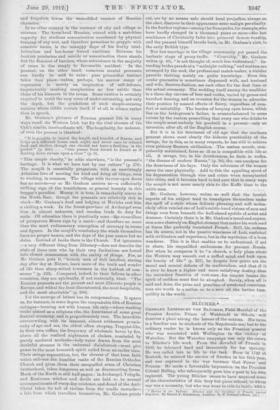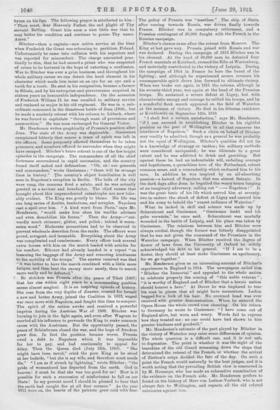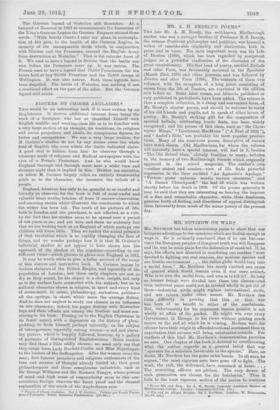BLOCHER.*...• • •
GEBHARD LESERECHT VON BUCHER.; Field-Marshal of the Prussian Armies, Prince of Wellstadt in • Silesia,•.• well deserves a place among the heroes of' the nations., -Hisname is a familiar one to students of the Napoleonie•eriq but:toll-1w ordinary reader he is known Only as the Prussian 'general who was associated with Wellington in -the .1riet)ory -.of Waterloo. But the Waterloo campaign was only theorown to Bliicher's life work. From the 'downfall of Prussia hi. 1806, he laboured hard and incessantly for her Uprising,: He was called late in life to the.•-task. Born' in 1742-at Roatook, he entered the service of Sweden in his' ltithle* and was .captured in the war between that Pewee. and Prussia.. He made a 'favourable impression, on the PrueSian Colonel Belling, who subsequently.gave him a post in his dwn regiment. The •.y mug Bindles seemS. to have acqUired some of the characteristics of this fiery but pious .colonel; to whom war was a necessity, but who was *vvont to ride to battle with a
-
Hrocs of tho Nations : 11111chor and flu; Up Pru8sia cioainst,
Napoleon. By Ernest P. .Henderson. London: 0, P. Putnam's Sons. [5s..1
hymn on his lips. The following prayer is attributed to him : "Then nest, dear Heavenly Father, the sad plight of Thy servant Belling. Grant him soon a nice little war that he may better his condition and continue to praise Thy name. Amen."
Bliicher—then a captain—saw active service at the time when Frederick the Great was scheming to partition Poland. Unfortunately he came into collision with his superiors and was reported for misconduct. The charge amounted prac- tically to this, that be had caused a priest who was suspected of crime to be tortured in the hope of extorting a confession. War to Bliicher was ever a grim business, and throughout his whole military career we can detect the hard element in his character which made him insist on an eye for an eye and a tooth for a tooth. He sent in his resignation, became a farmer in Silesia, and by his enterprise and perseverance acquired in sixteen years an honourable independence. On the accession of Frederick William II. he was recalled to military service and replaced as major in his old regiment. He was in a sub- ordinate command in the disastrous battle of Jena (1806), but he made a masterly retreat with his column to Lubeck, where he was forced to capitulate "through want of provisions and ammunition." He was soon exchanged for General Victor.
Mr. Henderson writes graphically of Prussia's position after Jena. The state of the Army was deplorable. Gneisenau complained bitterly that scarce a trace of spirit was left in the officers. Some purposely allowed themselves to be taken prisoners, and numbers offered to surrender when they might have escaped. Blucher's brave retreat is one of the few bright episodes in the campaign. The commanders of all the chief fortresses surrendered in rapid succession, and the country found itself naked and defenceless. "Oh, oh ! our generals and commanders," wrote Gneisenau ; "these will be strange lines in history." The country's abject humiliation is well seen in Napoleon's reception in Berlin. The bells of the city were rung, the cannons fired a salute, and he was actually greeted as a saviour and benefactor. The chief causes that brought about this unprecedented catastrophe are now toler- ably evident. The King was greatly to blame. His life was one long series of doubts, hesitations, and scruples. Napoleon cast a spell over him. "A kind word from Paris," says Mr. Henderson, "would make him shun his warlike advisers and even demobilize his forces." Then the Army—" out- wardly much shimmer, glitter, and polish ; behind it worm- eaten wood." Elaborate precautions had to be observed to prevent wholesale desertion from the ranks. The officers were proud, arrogant, and incapable. Everything about the Army was complicated and cumbersome. Every officer took several extra horses with him on the march loaded with articles for his comfort. Bliicher had already handed in a report "on lessening the baggage of the Army and removing hindrances to the mobility of the troops." The answer received was that "it was better to have the march combined with a little more fatigue, and then beat the enemy more surely, than to march mon easily and be defeated."
So stricken was Prussia after the peace of Tilsit (1807) that her rise within eight years to a commanding position seems almost magical. It is an inspiring episode of history. She rose from the very depths of disaster, created for herself a new and better Army, joined the Coalition in 1813, waged war once more with Napoleon, and fought this time to conquer. The spirit of the nation awoke and received a powerful impetus during the Austrian War of 1809. Blucher was burning to join in the fight again, and even after Wagram he exerted all his influence to persuade the King to make common cause with the Austrians. But the opportunity passed, the peace of SchOnbrunn closed the war, and the hope of freedom grew dim. In fact the position became worse. Prussia owed a debt to Napoleon which it was impossible for her to pay, and had continually to appeal for delay. Then the Queen died (July 19th, 1810). " She might have been saved," cried the poor King as he stood at her bedside, "but she is my wife, and therefore must needs die." "I am as if struck by lightning," wrote Blficher ; "the pride of womanhood has departed from the earth. God in heaven! it must be that she was too good for us! How is it possible for such a succession of misfortunes to fall on our State! In my present mood I should be pleased to bear that the earth had caught fire at all four corners." As the year 1811 wore on, the hearts of the patriots grew cold with fear. The policy of Prussia was "mastless." The ship of State; after veering towards Russia, was driven finally towards France. Bliicher was in compulsory retirement, and n Prussian contingent of 20,000 fought with the French in the Russian campaign.
Blucher's chance came after the retreat from Moscow. The King at last gave way. Prussia joined with Russia and war was declared. During the campaign of 1813 Blucher was in his element. At the head of 60,000 men he defeated four French marshals at Ka tzbaeli, crossed the Elbe at Wartenburg, and materially contributed to the victory of Leipzig. During the campaign of 1814 in France he bore the brunt of the fighting; and although he experienced severe reverses his unconquerable spirit drove him forward to ultimate victory.
When war broke out again in 1815 the veteran, although in his seventy-third year, was again at the head of the Prussian troops. He sustained a severe defeat at Ligny, but with characteristic energy and courage he rallied his troops, and by a wonderful flank march appeared on the field of Waterloo at the moment of victory. He died in his Silesian residence at Krieblowitz on September 12th, 1819.
"I shall feel a certain satisfaction," says Mr. Henderson,. "if I can succeed in establishing Blacher in his rightful position as the peer of Wellington in all that concerns the overthrow of Napoleon." Such a claim on behalf of Bliielier may readily be admitted, though as a general lie was probably not the equal of Wellington. Blucher's qualities did not lie in a knowledge of strategy or tactics ; his military methods were considered antiquated ; he was illiterate to a great extent and he was addicted to drink and gambling. But against these he had an indomitable will, unfailing courage and hopefulness, a quenchless love of the Fatherland, robust common sense, and a comradeship which endeared him to his men. In addition be was inspired by an all-absorbing passion—a hatred of Napoleon that was almost Satanic. In the dark days after Jena be beguiled the weary hours lunging at an imaginary adversary, calling out "— Napoleon !" It was the great tonic of his life which nerved him at seventy- two to endure the shock of defeat at Ligny and carried him and his army to behold the "sunset radiance of Waterloo."
What he lacked in skill and science was made up by Scbarnhorst and Gneisenatt. "Gneisenau lenkt und icli
gehe vorwarts," he once said. Scharnhorst was mortally wounded in the battle of Leipzig, and his place was taken by Gneisenau. The relations between him and Blucher were always cordial, though the former was bitterly disappointed that he was not given the command of the Prussians in the Waterloo campaign. When Bliieher received the degree of doctor of laws from the University of Oxford he wittily acknowledged his debt to his general. "If I am to be a doctor, they should at least make Gneisenau an apothecary, for we go together."
Mr. Henderson gives us an interesting account of Bliichees experiences in England in 1814. The newspapers called him " Bliicher the Immortal" and appealed to the whole nation to celebrate properly the coming of "this noble veteran " ;. "it is worthy of England and of Blucher that a heroic nation should honour a hero." At Dover lie was implored to tear his coat in pieces that all might have mementoes. Ladies begged for a lock of his hair. No crowned head was ever received with greater demonstration. When he entered the Opera House the whole crowd rose cheering. On his return to Germany he wrote to Gneisenau: "I have come out of England alive, but worn and weary. Words fail to express how they treated me : no one could have had shown to him greater kindness and goodwill."
Mr. Henderson's estimate of the part played by Bliicher in the victory of Waterloo may raise some differences of opinion. The whole question is a difficult one, and it is not safe to dogmatize. The point is whether it was the sight of the
bearskins of the old Guard streaming down the slope that determined the retreat of the French, or whether the arrival of Ziethen'e corps decided the fate of the day. On such a point the French would naturally be the best judges, and it is worth noting that the prevailing British view is concurred in
by M. Houssaye, who has made an exhaustive examination of the evidence on the French side. Mr. Henderson prefers to found on the history of Herr von Lettow-Vorbeck, who is not always fair to Wellington, and repeats all the old refuted calumnies against him. The German legend of Waterloo still flourishes. At a banquet at Hanover in 1903 to commemorate the formation of the King's German Legion the German Emperor uttered these words : "With hearty thanks I raise my glass, in contempla- tion of the past, to the health of the German Legion, in memory of the incomparable deeds which, in conjunction with Bliicher and the Prussians, rescued the English Army from destruction at Waterloo." That is the extreme form of it. We used to have a legend in Britain that the battle was won before the Prussians came up. It was untrue. The French used to have a legend that 70,000 Frenchmen for ten hours held at bay 80,000 Prussians and the 70,000 troops of Wellington. It was also untrue. Both these legends have been dispelled. The battle of Waterloo was nothing if not a combined effort on the part of the allies. But the German legend still exists.
























































 Previous page
Previous page